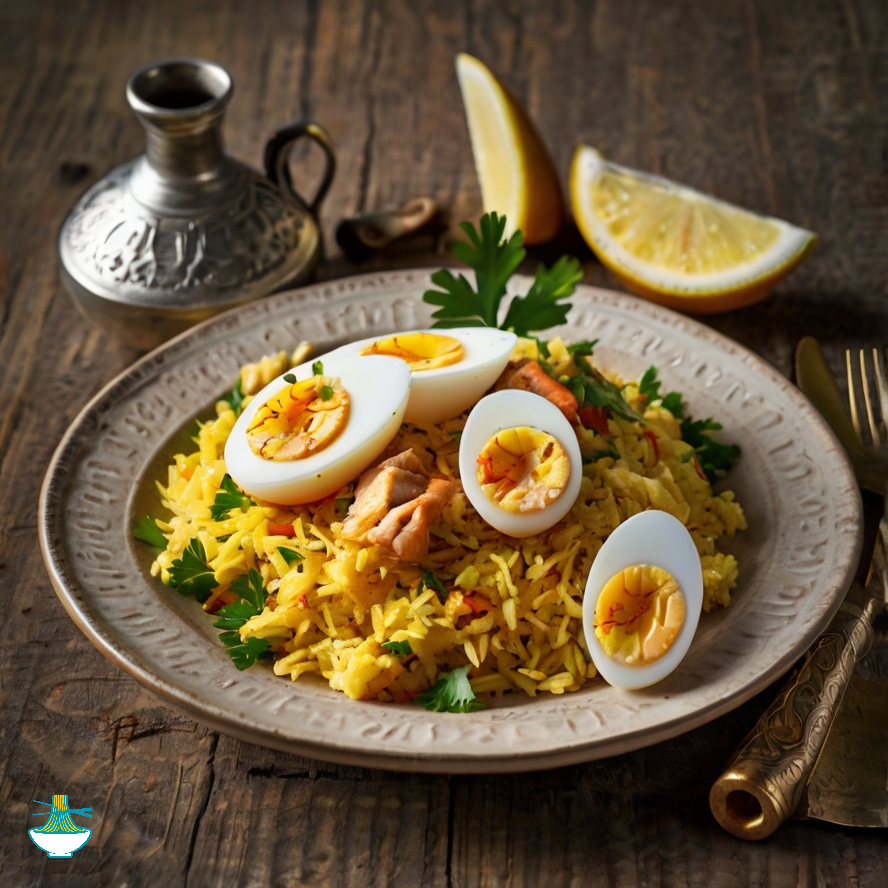Kedgeree or English curried rice and fish: A colonial Indian dish adopted into British cuisine, featuring rice, smoked haddock, eggs, parsley, and curry powder.
The dish is a fusion of Indian and British culinary influences, reflecting the colonial history of India. Originally introduced to the British by returning colonists, kedgeree evolved over time to include local ingredients and spices, such as curry powder, creating a unique and beloved dish. Today, it remains a classic breakfast or brunch option, cherished for its delicious combination of flavors and cultural heritage.
Ingredients:
- 1 cup long-grain white rice
- 2 cups water
- 1 tablespoon vegetable oil
- 1 onion, finely chopped
- 1 teaspoon curry powder
- 1/2 teaspoon ground turmeric
- 1/2 teaspoon ground cumin
- 1/2 teaspoon ground coriander
- Salt, to taste
- 1 cup cooked flaked fish (smoked haddock works well)
- 2 hard-boiled eggs, chopped
- Fresh parsley, chopped (for garnish)
Instructions:
1. Rinse the rice under cold water until the water runs clear. Drain well.
2. In a saucepan, bring 2 cups of water to a boil. Add the rice, reduce the heat to low, cover, and simmer for about 15-20 minutes or until the rice is cooked and the water is absorbed.
3. In a separate large skillet, heat the vegetable oil over medium heat. Add the chopped onion and sauté until softened.
4. Stir in the curry powder, turmeric, cumin, coriander, and salt. Cook for another minute until fragrant.
5. Add the cooked rice, flaked fish, and chopped hard-boiled eggs to the skillet. Gently stir everything together until well combined and heated through.
6. Serve the kedgeree hot, garnished with fresh chopped parsley.
This recipe is straightforward and should yield delicious results. You can adjust the spices and seasoning according to your taste preferences. Enjoy your homemade kedgeree!
Nutrition Value:
1. Long-grain white rice (1 cup cooked):
- Calories: 205 kcal
- Carbohydrates: 45 grams
- Protein: 4 grams
- Fat: 0.4 grams
- Sodium: 2 mg
- Cholesterol: 0 mg
- Vitamins: Contains small amounts of vitamins B1, B3, and B6.
- Minerals: Provides small amounts of iron and magnesium.
- Nutritional benefits: Good source of energy from carbohydrates, low in fat, and gluten-free.
2. Water (2 cups):
- No significant nutritional value. Essential for hydration and aiding various bodily functions.
3. Vegetable oil (1 tablespoon):
- Calories: 120 kcal
- Fat: 14 grams
- No significant amounts of other nutrients.
- Nutritional benefits: Provides healthy fats, including monounsaturated and polyunsaturated fats, essential for cell function and vitamin absorption.
4. Onion, finely chopped (1 onion):
- Calories: 44 kcal
- Carbohydrates: 10 grams
- Protein: 1 gram
- Fat: 0.1 grams
- Sodium: 4 mg
- No significant amounts of cholesterol, vitamins, or minerals.
- Nutritional benefits: Contains antioxidants, particularly quercetin, and may have anti-inflammatory properties.
5. Curry powder (1 teaspoon):
- Calories: 8 kcal
- Carbohydrates: 1.5 grams
- Protein: 0.3 grams
- Fat: 0.4 grams
- Sodium: 2 mg
- No significant amounts of cholesterol, vitamins, or minerals.
- Nutritional benefits: May contain anti-inflammatory spices like turmeric and cumin, which have been linked to health benefits.
6. Ground turmeric (1/2 teaspoon):
- Calories: 4 kcal
- Carbohydrates: 1 gram
- Protein: 0.1 grams
- Fat: 0.1 grams
- Sodium: 1 mg
- No significant amounts of cholesterol, vitamins, or minerals.
- Nutritional benefits: Contains curcumin, a compound with potential anti-inflammatory and antioxidant properties.
7. Ground cumin (1/2 teaspoon):
- Calories: 4 kcal
- Carbohydrates: 0.6 grams
- Protein: 0.2 grams
- Fat: 0.2 grams
- Sodium: 1 mg
- No significant amounts of cholesterol, vitamins, or minerals.
- Nutritional benefits: Contains antioxidants and may aid digestion.
8. Ground coriander (1/2 teaspoon):
- Calories: 5 kcal
- Carbohydrates: 1 gram
- Protein: 0.2 grams
- Fat: 0.2 grams
- Sodium: 1 mg
- No significant amounts of cholesterol, vitamins, or minerals.
- Nutritional benefits: Contains antioxidants and may have antimicrobial properties.
9. Salt, to taste:
- Sodium content varies depending on the amount added. Recommended intake should be limited to avoid excessive sodium consumption.
10. Cooked flaked fish (1 cup):
- Nutritional content varies based on the type of fish used. For smoked haddock:
- Calories: Approximately 156 kcal
- Protein: Approximately 34 grams
- Fat: Approximately 1.5 grams
- Sodium: Approximately 645 mg
- Cholesterol: Approximately 80 mg
- Vitamins and minerals: Rich in vitamins B12 and D, as well as selenium and phosphorus.
- Nutritional benefits: Excellent source of lean protein and omega-3 fatty acids, which support heart health and brain function.
11. Hard-boiled eggs, chopped (2 eggs):
- Calories: 156 kcal
- Protein: 13 grams
- Fat: 11 grams
- Sodium: 124 mg
- Cholesterol: 372 mg
- Vitamins: High in vitamin A, D, E, and B vitamins, particularly B12 and riboflavin.
- Minerals: Rich in selenium, phosphorus, and iron.
- Nutritional benefits: Good source of high-quality protein, essential fatty acids, and various vitamins and minerals.
12. Fresh parsley, chopped (for garnish):
- Calories: 1 kcal (per tablespoon)
- Negligible amounts of carbohydrates, protein, and fat.
- Rich in vitamins A, C, and K, as well as folate and iron.
- Nutritional benefits: Contains antioxidants and may aid digestion and support bone health.
These nutritional values are approximate and may vary slightly depending on factors such as cooking methods and ingredient brands. Adjustments can be made based on dietary preferences and requirements.


Comments